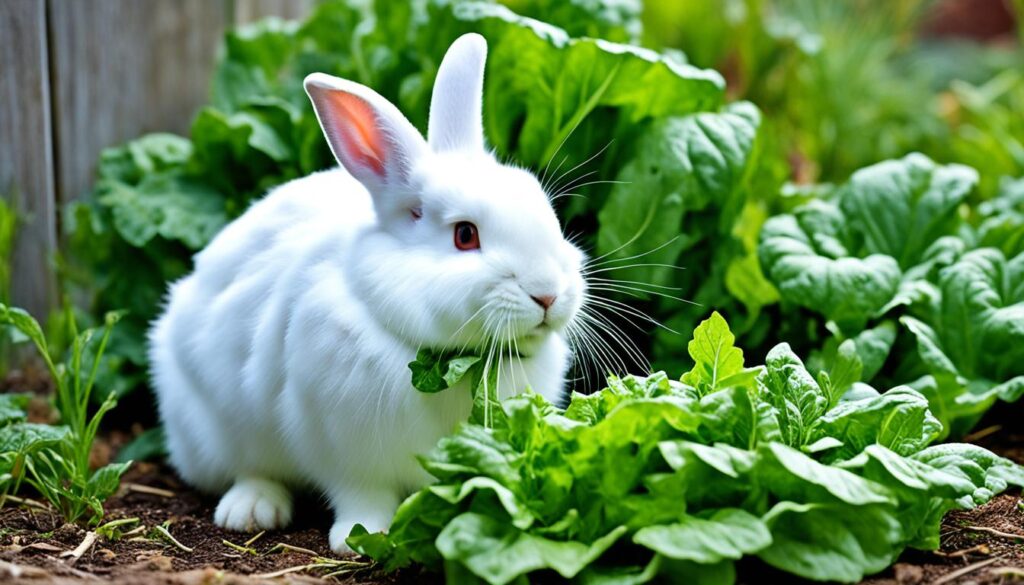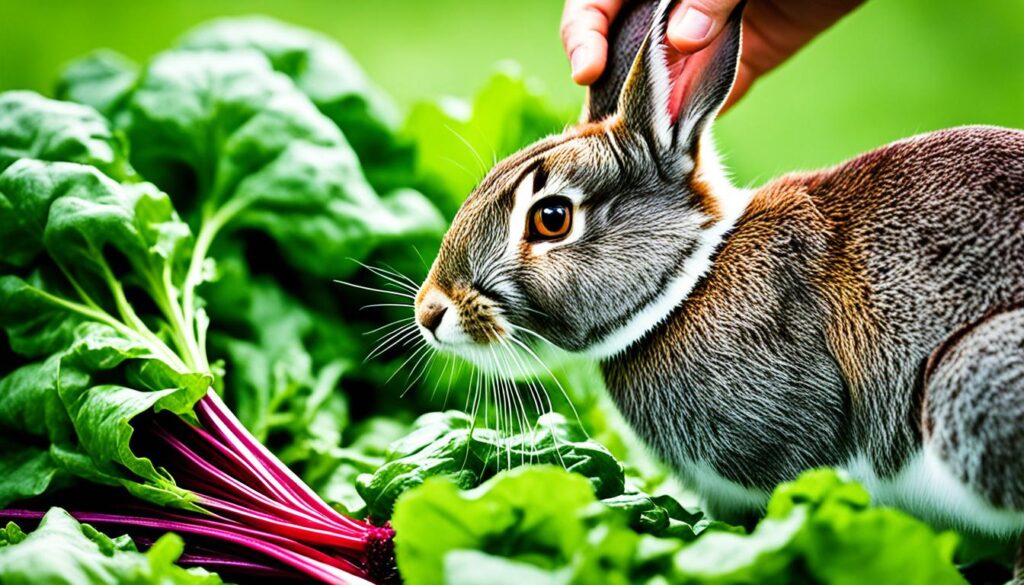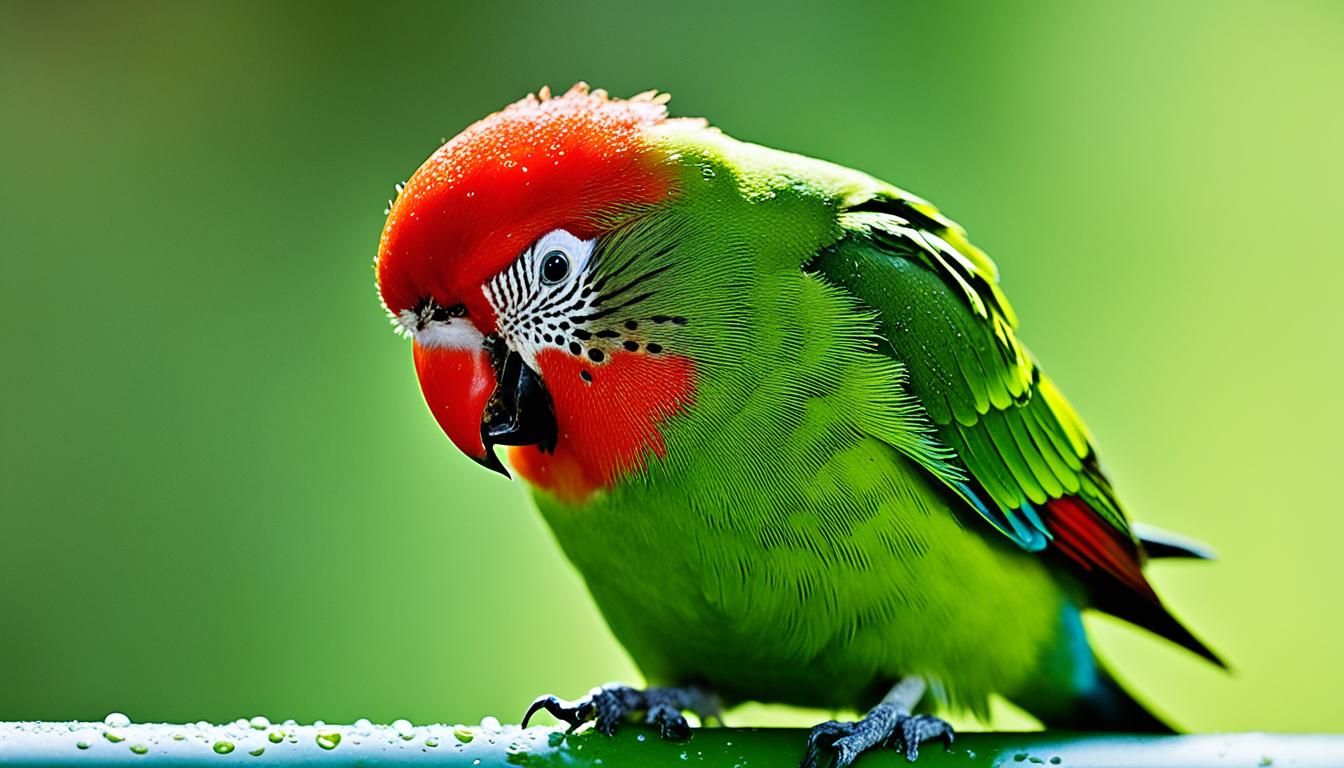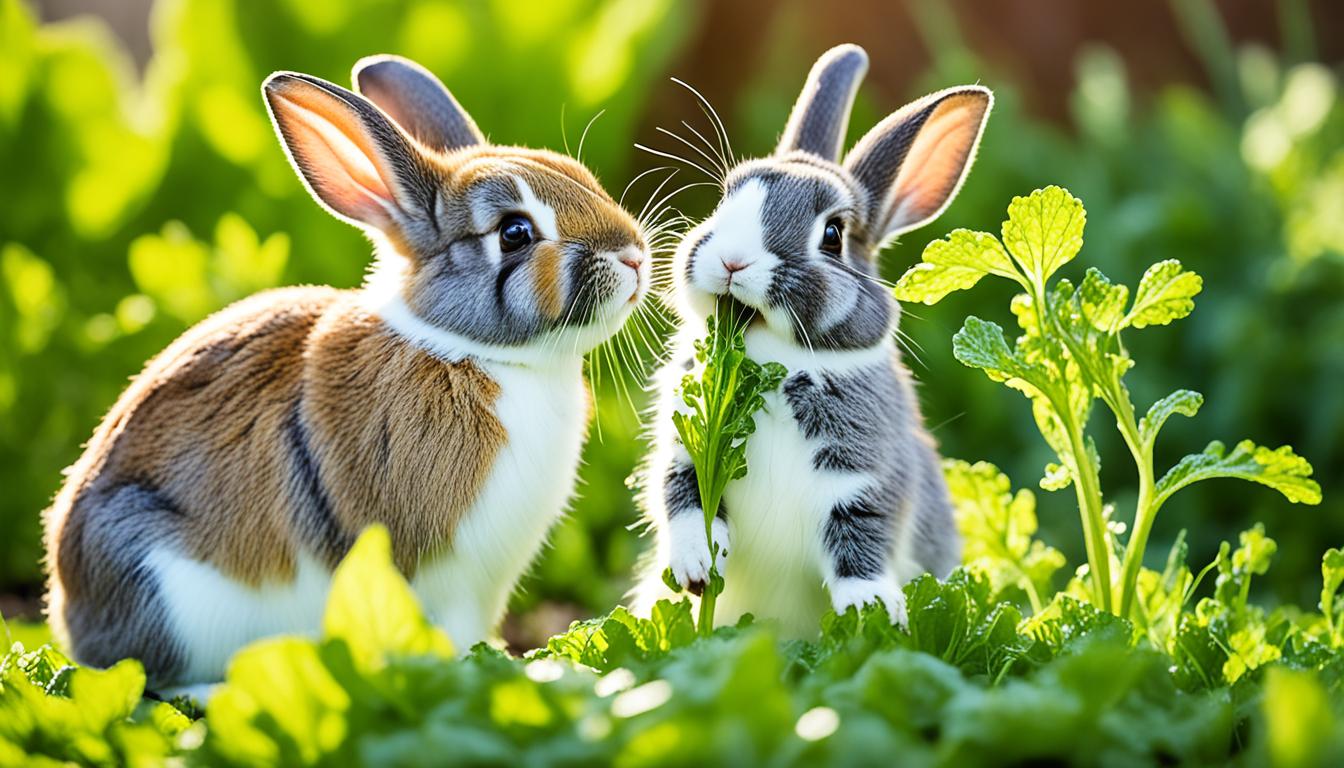Did you know that rabbits can eat beet greens? While it may be surprising, these leafy greens can actually be a part of your rabbit’s diet. However, it is crucial to keep certain factors in mind to guarantee the safety and health of your beloved pet.
Key Takeaways:
- Rabbits can eat beet greens, but they should be fed sparingly due to their high oxalic acid content.
- Beet greens should be offered as a treat once or twice a week and balanced with other low-calcium vegetables.
- It’s important to cut beet greens into small pieces and wash them thoroughly before feeding them to rabbits.
- Source organic and pesticide-free beet greens to avoid potential health risks.
- Remember that hay remains the most important part of a rabbit’s diet.
Are Beet Greens Safe for Rabbits to Eat?
Beet greens are considered safe for rabbits to eat, but it’s important to understand the potential risks and feed them in moderation. Similar to parsley and spinach, beet greens contain oxalic acid, which can be harmful in large quantities. Therefore, it’s best to offer beet greens as an occasional treat rather than a staple part of your rabbit’s diet.
The high calcium content in beet greens can also pose a concern for rabbits. While calcium is essential for their health, excessive amounts can lead to urinary problems, including the formation of bladder stones. To mitigate this risk, it’s recommended to balance the intake of beet greens with other low-calcium vegetables.
Feeding beet greens to rabbits too frequently can also result in digestive issues, such as gas and diarrhea. Therefore, it’s crucial to introduce beet greens gradually and observe your rabbit’s response. If any digestive disturbances occur, it’s best to remove or reduce the amount of beet greens in their diet.
Fun Fact: After consuming beet greens, it’s normal for a rabbit’s urine to turn slightly red. Don’t be alarmed, as this is a harmless effect of the pigments present in the greens.

Overall, while beet greens can provide valuable nutrients to rabbits, it’s crucial to offer them sparingly and in combination with other vegetables and hay to ensure a well-balanced diet. The focus should primarily be on providing high-quality hay, which is essential for a rabbit’s digestive health and overall well-being.
Nutritional Benefits of Beet Greens for Rabbits
Beet greens offer several nutritional benefits for rabbits. They are rich in vitamins, such as vitamin A and vitamin C, which support the immune system and overall health. Beet greens also contain calcium, which is essential for strong bones and teeth in rabbits.
However, it’s important to note that beet greens should not be the sole source of vegetables for rabbits due to their high oxalic acid content and calcium levels. Instead, they should be part of a balanced diet that includes a variety of low-calcium vegetables and plenty of high-quality hay.

Adding beet greens to your rabbit’s diet can provide them with important vitamins and minerals, but it’s crucial to prioritize a diverse range of vegetables and a majority of hay to meet their nutritional needs effectively.
How to Safely Feed Beet Greens to Rabbits
Feeding beet greens to rabbits can be a nutritious addition to their diet, but it’s essential to follow certain guidelines to ensure their safety. By taking the necessary precautions, you can introduce beet greens to your rabbits in a way that maximizes their health benefits and minimizes any potential risks.
Choosing Fresh and Organic Beet Greens
When selecting beet greens for your rabbits, opt for fresh and organic varieties to avoid exposing them to harmful pesticides or chemicals. Organic beet greens are grown without the use of synthetic fertilizers or pesticides, making them a safer choice for your furry friends. Freshness is also crucial to ensure that the greens retain their nutritional value.
Thoroughly Washing the Greens
Before feeding beet greens to your rabbits, it’s essential to wash them thoroughly to remove any dirt, debris, or chemical residue. Running the greens under cool water and gently rubbing the leaves can help ensure that they are clean and safe to eat. This step is particularly important if you don’t have access to organic beet greens.
Preparing the Beet Greens
Prior to offering beet greens to your rabbits, it’s essential to trim off the stems and tough parts of the leaves. These parts can be challenging for rabbits to chew and digest, increasing the risk of choking or gastrointestinal issues. By removing these parts, you create smaller, more manageable pieces that are easier for your rabbits to eat and digest.
Balancing Beet Greens with Low-Calcium Vegetables
Beet greens contain high levels of calcium, which can be problematic for rabbits if they consume them in excess. To avoid imbalances, it’s crucial to balance the intake of beet greens with other low-calcium vegetables in your rabbits’ diet. By offering a variety of vegetables, you provide a balanced range of nutrients while ensuring that calcium levels remain within a safe range.
Monitoring Your Rabbit’s Reaction
Each rabbit is unique, and their bodies may react differently to certain foods, including beet greens. It’s important to monitor your rabbits closely after introducing beet greens to their diet. Watch for any signs of digestive issues, such as diarrhea or gas. If you notice any adverse reactions, consult a veterinarian for personalized advice and guidance.

| Feeding Tips for Beet Greens | Preparing Beet Greens for Rabbits | Introducing Beet Greens to Rabbits |
|---|---|---|
| Choose fresh and organic varieties | Thoroughly wash to remove dirt and debris | Start with small pieces to prevent choking |
| Trim off stems and tough parts | Balance with low-calcium vegetables | Monitor for any adverse reactions |
Including Beet Greens in a Rabbit’s Balanced Diet
When it comes to providing a balanced diet for rabbits, incorporating beet greens can be a nutritious addition. However, it’s important to maintain overall balance and meet the daily nutritional needs of your furry friend.
Hay should make up the majority of a rabbit’s diet, as it provides essential fiber for digestion and promotes optimal intestinal motility. Fresh greens and a limited variety of safe vegetables can be given as supplements to enhance their nutrition. It is recommended to provide one cup of vegetables per four pounds of body weight per day, split into two servings.
When including beet greens in their diet, it’s crucial to combine them with other low-calcium vegetables to avoid calcium imbalances. Incorporating a variety of vegetables, including leafy greens and non-leafy greens, will help meet a rabbit’s nutritional needs.
Vegetables for a Balanced Rabbit Diet
Below is a list of vegetables that can be incorporated into a rabbit’s balanced diet:
- Carrots
- Broccoli
- Peppers (red, green, or yellow)
- Spinach
- Romaine lettuce
- Kale
- Cilantro
- Cabbage
- Bell peppers
- Parsley
Remember to introduce new vegetables gradually, one at a time, to monitor your rabbit’s tolerance and reaction.
Tip: Always consult a veterinarian to determine the specific dietary needs of your rabbit based on their age, weight, and overall health.
By maintaining a balanced diet and incorporating beet greens in moderation, you can ensure that your rabbit receives the necessary nutrients for optimal health and well-being. The table below summarizes the daily nutritional needs of rabbits:
| Nutrient | Recommended Daily Amount |
|---|---|
| Fiber | Unlimited access to high-quality hay |
| Vegetables | One cup per four pounds of body weight per day |
| Water | Always available |
| Pellets | 1/8 to 1/4 cup per six pounds of body weight per day (if provided) |
| Fruit | Occasional treats, no more than 1-2 tablespoons per six pounds of body weight per day |

Can Beet Greens Help with a Rabbit’s Digestion?
While beet greens are a nutritious addition to a rabbit’s diet, they should be fed in moderation as they do not provide as much fiber as hay does. Fiber plays a crucial role in promoting good digestion and regular bowel movements in rabbits.
Hay, on the other hand, is an essential component of a rabbit’s diet. It not only provides the necessary fiber but also aids in promoting motility in the rabbit’s intestines. Feeding excessive amounts of vegetables, including beet greens, can lead to digestive issues such as gas and diarrhea.
Thus, it is important to limit the amount of vegetables, including beet greens, to around 15% of a rabbit’s diet. Prioritizing the consumption of hay ensures that rabbits receive sufficient fiber to maintain a healthy digestive system and prevent gastrointestinal problems.
While vegetables like beet greens contribute to a rabbit’s overall nutritional needs, it is vital to recognize that their main source of fiber should always be high-quality hay.

| Fiber Content | Role of Hay |
|---|---|
| Beet greens have a moderate fiber content, but they do not provide as much fiber as hay. | Hay is essential for promoting good digestion and regular bowel movements in rabbits. |
| Feeding excessive amounts of vegetables, such as beet greens, can cause digestive issues. | Hay helps prevent gastrointestinal problems and promotes motility in the rabbit’s intestines. |
| Limiting the amount of vegetables to around 15% of a rabbit’s diet is important. | Prioritizing the consumption of hay ensures a healthy digestive system in rabbits. |
By understanding the role of hay and the importance of fiber in a rabbit’s diet, we can ensure their digestion remains optimal. While beet greens can contribute to their overall nutrition, they should always be balanced with hay to promote a healthy digestive system.
Conclusion
In conclusion, rabbits can safely enjoy the nutritional benefits of beet greens as part of a balanced diet. While beet greens offer vitamins and minerals, they should be fed sparingly due to their high oxalic acid and calcium content. We recommend feeding beet greens once or twice a week, ensuring to balance their intake with other low-calcium vegetables.
Proper preparation is important to ensure your rabbit’s safety. Remember to wash the beet greens thoroughly and cut them into small pieces to prevent choking. However, it’s crucial to understand that hay remains the most essential component of a rabbit’s diet. Hay provides the necessary fiber for proper digestion and overall health.
Consulting a veterinarian for personalized feeding advice is always recommended. Additionally, closely monitor your rabbit’s reactions to different vegetables and adjust their diet accordingly. By following these feeding guidelines, you can safely incorporate beet greens into your rabbit’s diet and enhance their overall nutrition and well-being.









